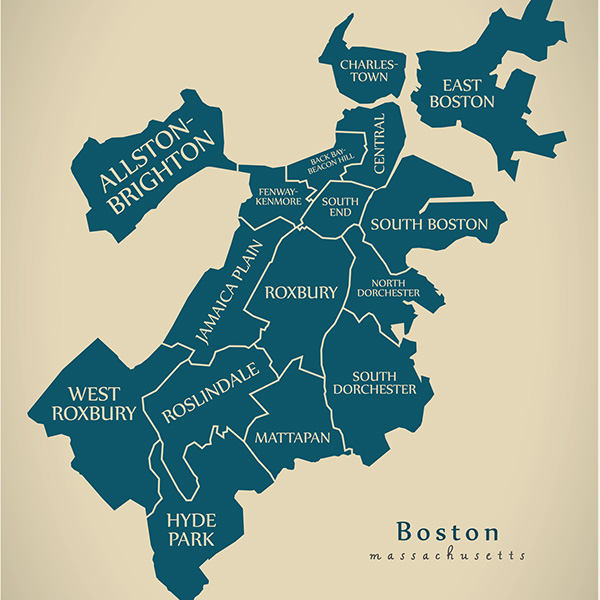Your Everything Guide to Living Off Campus

Your Everything Guide to Living Off Campus
Our occasional series keeps you moving when it’s time to move
Terriers, welcome to your home away from home. While Boston has no shortage of charms, it also has one of the most expensive, and competitive, rental markets in the country. Boston University offers students a respite by housing undergraduates on campus until graduation—but plenty of graduate students, transfers, and even some undergrads opt to live off campus for all sorts of reasons.
As of 2022, more than 38,000 college students in Boston live off campus. One of them is Shannon McKean.
“I like having my own space, and I like cooking,” says undergrad McKean (CGS’22, Sargent’24). “I also have a cat, which is a lot easier off campus.” But, she adds, “there are a lot of moving costs that come with it. It’s a big lump sum.”
BU Off-Campus Services can help with much of the process. Overseen by Kimberly Santo (CAS’00, Wheelock’00,’02), assistant director of Judicial Affairs, this resource is responsible for maintaining a database of listings, providing helpful resources, and answering student questions.
But, if it’s your first time living off-campus, if you’re an international student, or if you feel like you’re about to buckle under the stress of it all, fear not: we’ve created a guide that addresses the basic elements of renting. Our aim is to help you find your own little corner of the Hub of the Universe.

When should I start looking?
It’s likely that your lease will run from September 1 through the end of the following August, but it’s best to start looking for a place as early as May. If you’re a recently accepted transfer or grad student, Santo recommends you start hunting as soon as you get your acceptance letter.
If you’re a singleton, congrats: you shouldn’t have much trouble finding a place. But for folks like McKean, who was tasked with finding a five-bedroom for herself and some friends, better give yourself an extra couple of months to land one.
“It took us two or three realtors before we found a place that we really liked, so we definitely had to be flexible,” she says.
International students tip: If you can’t take an in-person tour, consider starting to look as early as March or April—you don’t want to wind up in a place you were forced to take out of desperation. “I received my acceptance letter at the end of May, and at that time, a lot of international students had already found roommates,” says grad student Violet Li (COM’25). Luckily, she had a Terrier friend who helped her find a place, but it doesn’t always turn out so well.

How do I find a place?
Before you respond to that dubious listing on Craigslist, consider checking out Off-Campus Services database of available apartment rentals. The professionally vetted site allows a consortium of local college students to search by unit type, neighborhood, number of bedrooms, price, and more. BU students can filter their searches by roommate preference: other Terriers, other students in the consortium, or anyone in the area.
If you’re looking to replicate the on-campus experience by living with classmates, Santo recommends finding your school or college’s affinity page on social media sites like Facebook, and getting in touch with other students who might be looking to fill a room.

Where in the city should I live?

It’s true that Allston and neighboring Brighton are Boston’s student meccas: they’re near multiple universities, MBTA lines, restaurants, concert venues, and cheap(ish) apartments. The closer you get to downtown, like the Brookline neighborhood just off Comm Ave, or around Kenmore Square, the more likely you’ll see prices going up. But if you’re willing to expand your search area and adapt to having a longer commute to classes, apartment options will abound.
Santo says she has been making an effort to point students toward neighborhoods like Watertown, Cambridge, Somerville, Jamaica Plain, and parts of Brookline like Coolidge Corner, Washington Square, and Brookline Village.
If you want a closer look at the variety of vibrant and diverse nearby neighborhoods, you should check out BU Today’s Neighborhood Guides. But we also recommend that you use a GPS to calculate how long it’ll take you to get from that area to campus by bus, train, car, foot, bike, or even scooter.
Then add 15 minutes to that—and that’s your commute.

How do I handle roommates?
Messes, noises, passive-aggressive notes, oh my! You’re not going to navigate a communal living situation without some literal and metaphorical stickiness. The best advice is simple: communicate.
“If there was a problem, I’d probably send a text to our roommate group chat as a reminder,” McKean says, “and then if things weren’t getting resolved, we’d probably have some sort of roommate meeting or we’d just talk to each other when we’re all home.”
Want to live with your best friend? Make sure they are the kind of person you could see sharing a space with. If you wind up living with strangers and conflicts arise, it’s not the end of the world—as long as everyone respects one another’s wishes and boundaries. But conflicts with a close friend can be tricky. You’ve been warned.
International students tip: Many international students find roommates using their own country’s social media platforms. Li, who is from China, recommends Weibo and WeChat to Chinese students. It’s also a good idea to look for someone who already knows the city and can help you get acclimated.

What steps should I take before I move in?
Don’t be shy about asking questions. Here are a few important ones Santo recommends:
- Were the previous tenants students?
- Did previous occupants cause any issues?
- Have there been maintenance or pest issues?
- What are the rules for subletting?

Pay attention to the unit’s condition before you move in, because if you want your security deposit back, that’s how it needs to look when you leave. If you can’t do a preliminary walk-through, Jade Brown (LAW’16), a BU School of Law clinical associate professor, recommends making a checklist of the apartment’s condition and alerting the landlord of anything needing repair either prior to moving in or soon after. Probably not a bad idea to take pictures, either, since they will be time stamped on your phone.
“Having that checklist is also a great way of being able to push for those things to be fixed,” Brown says.
And bear in mind, not every building is going to be perfect.
“Things like exposed pipes are not necessarily a huge concern,” Santo says. “There’s always going to be certain quirks because Boston has such old construction.”
International students tip: Be aware that some landlords will require tenants to have a Social Security number. But don’t worry! See if they will accept a US-based cosigner, a copy of your BU acceptance letter, a letter from your bank on official letterhead, a copy of your visa and I-20 documents, or some combination thereof.

How do I avoid red flags?
First things first: there are a lot of scam listings out there. The golden rule is: never sign anything without seeing a property first, but there are lots of other ways to avoid being duped.
For one thing, you don’t want to be reaching for your wallet before you sign the lease.
“Typically, at the time you sign a lease, you would be paying first and last month’s rent, a security deposit that cannot exceed one month’s rent, and potentially, a broker’s fee, which also cannot exceed one month’s rent,” Santo says. “If a person is asking for all of that before you even see a lease, that’s a huge red flag.”
Before signing, look up an example lease from your city’s real estate board. A lot of landlords will use this exact form, and it also serves as a handy example of what it should look like. This can help prevent you from signing a suspicious document.
Once you’re sure your property is legit, pay attention when you’re doing your in-person or virtual tour. Keep an eye out for smoke detectors, fire escapes (there should be two points of egress in every bedroom), and exposed wires or hardware. You can also request this information from the property owner or realtor. And if they won’t provide it? Santo says it best: “Move on. You don’t want to do business with them.”
International students tip: You already know what information you need to provide if you don’t have a Social Security number. But if they’re still pushing back, it might not be a good idea to rent there. Reach out to Off-Campus Services if you’re looking for companies with a history of working with international students.

How should I deal with my landlord?
In most cases, it’s your landlord’s responsibility to fix any issues you’re having with your apartment. So there’s no need to take a frantic trip to Home Depot or Target—just pick up the phone.
“If, for instance, the tenant has a rodent issue or bug infestation, a lot of times landlords might say, ‘Put down a trap, figure it out,’ but that’s not actually what’s required under the state sanitary code,” says Brown. “The landlord is required to take some kind of remedial measure.” It’s their job, not yours.
Of course, not every landlord is as amenable and responsive as they should be.
“Our landlord doesn’t always take our calls,” Li admits. “When one of us doesn’t get a response, we’ll take turns writing emails or messaging her to make sure she replies to us.”
Just remember the law is on your side.
“The right of quiet enjoyment is the ability to use and enjoy your apartment without interference,” Brown says. “If the landlord is doing construction on the floor above you for hours at a time with no notice, or if they’re refusing to remove trash in a timely manner and you always have an awful smell in your apartment, that may be a breach of quiet enjoyment.”

Dollars and cents (and sense)
Like we said at the start, it’s expensive to live in Boston. But it’s also doable if you’re flexible and willing to think outside the box. “If a student tells me they have a very low budget, I’d direct them to the section of our website that has alternative housing options,” Santo says.
One option, Our Home Boston, is a homestay company that places students with local families.
“Linens are provided, it’s secure, it’s safe, and you can rent for as low as one month and up to a year,” she says.
If that’s not your jam, your best bet is to shop smart and to keep an eye on incidental fees. Pay attention to the utilities that are listed in your lease—and if heat is included: jackpot.
“Think in advance about how you are going to split utilities with your roommates,” McKean says. “We have enough people so that one person pays Wi-Fi, one person pays electric, one person pays gas, and we all Venmo request each other so that no one person has to front one thing.”
And finally: “Don’t agree to anything that you can’t afford,” Brown says. “Stay cognizant of fees, and always try to negotiate if you can. You don’t know if you don’t ask.”
This Series
Also in
The BU Guide to Everything
-
September 3, 2024
Your Everything Guide to Dropping Off Your Freshman at College
-
March 1, 2024
Your Everything Guide to Coffee
-
February 28, 2024
Your Everything Guide to Studying Abroad at BU


Comments & Discussion
Boston University moderates comments to facilitate an informed, substantive, civil conversation. Abusive, profane, self-promotional, misleading, incoherent or off-topic comments will be rejected. Moderators are staffed during regular business hours (EST) and can only accept comments written in English. Statistics or facts must include a citation or a link to the citation.